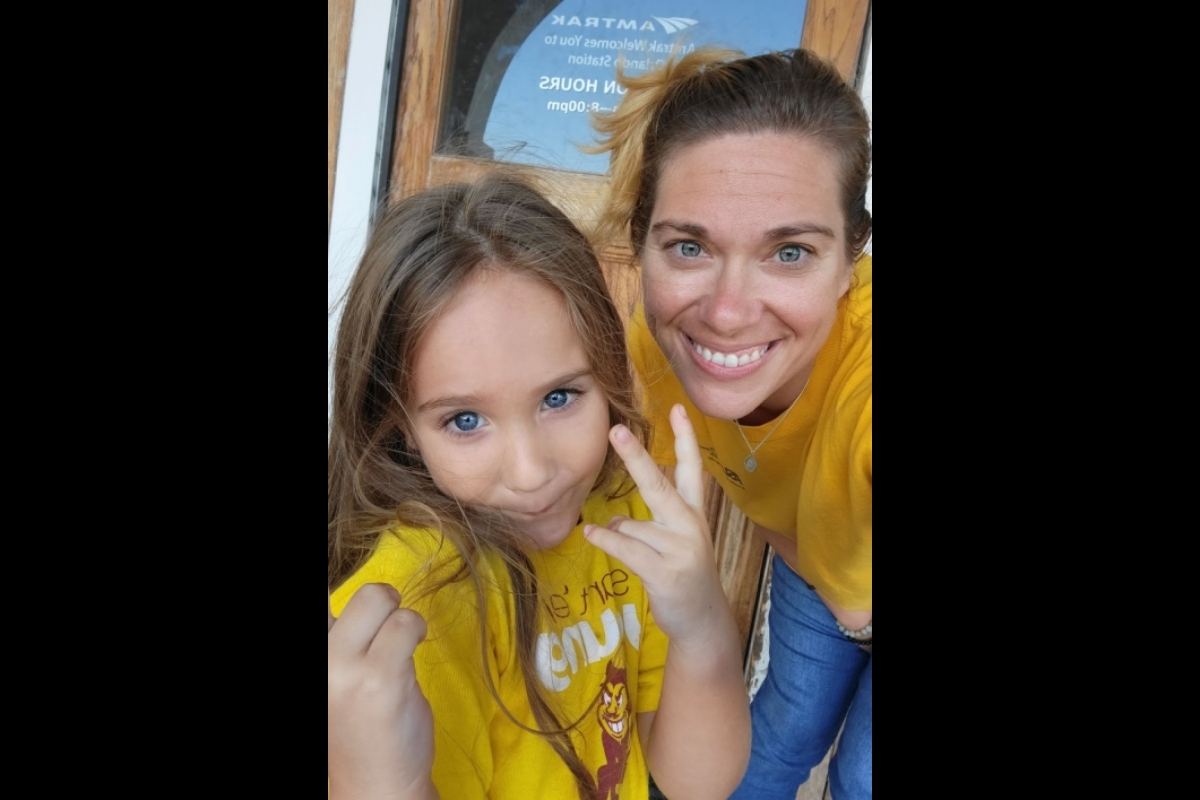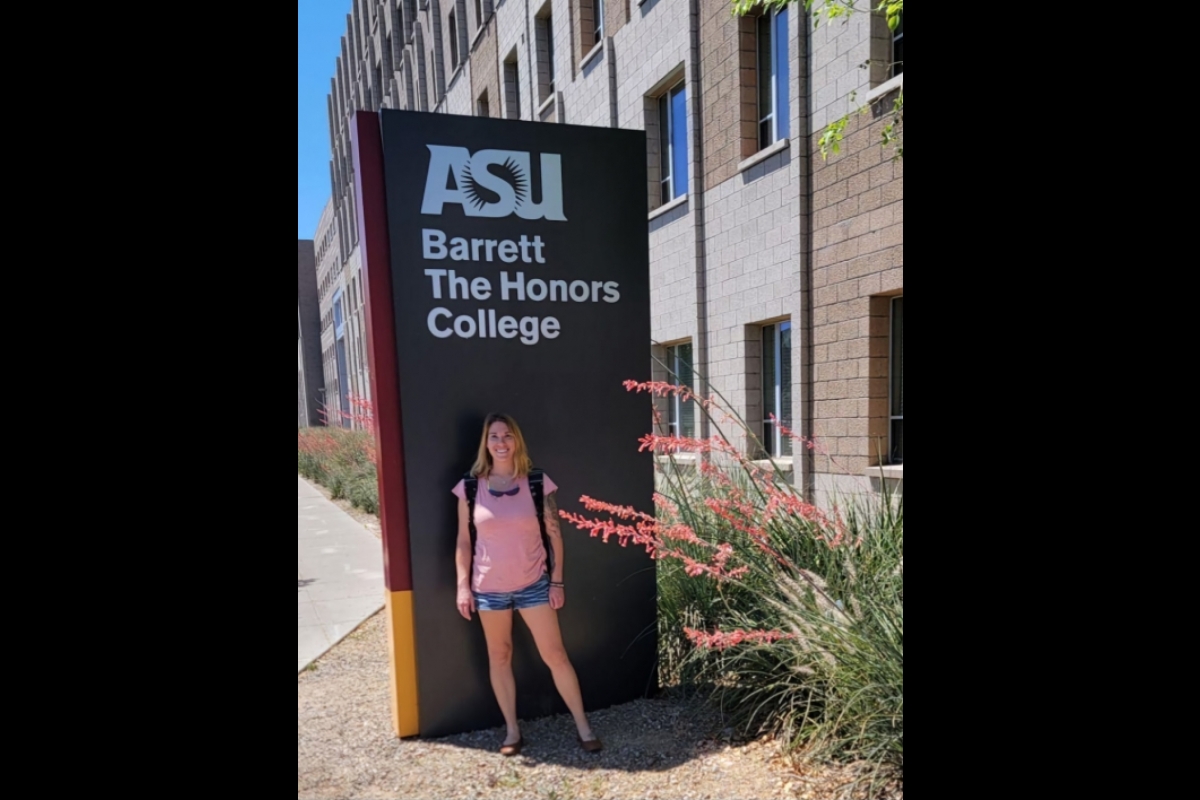ASU Online student encourages others to study abroad, take advantage of all ASU has to offer

Of her trip to Antarctica, ASU Online student Lauren Richards said, “Being in the environment and on the ship changed everything about my life, my outlook. ... I became a much stronger, much more balanced person.” She also shared her advice that other students pursue scholarship opportunities for study abroad: “I didn’t pay a penny out of my own pocket for that trip.”
Lauren Richards has studied abroad in Antarctica, actively participated in faculty-led research, started a nonprofit organization and received multiple awards during her time at Arizona State University. She has accomplished all of this and more while living in Florida and working toward her College of Global Futures degree online.
Her experiences may seem out of the norm for an online student, but according to Richards, “ASU Online is not a typical online learning experience.”
Richards has participated in other online programs before and reiterated that her ASU Online experience has been far more comprehensive.
“The opportunities here are the biggest standout for me — having the opportunity to be involved in research and participate in study abroad experiences was huge,” said Richards. “To be able to go to Antarctica as an online student is not something that you can get from any other school in the world, and I think it says a lot about ASU and ASU Online.”
She shared that a big part of being an online student is seeking out opportunities that aren’t necessarily on the surface, or creating opportunities for yourself. Virtual learning can make some students feel disconnected from their faculty or campus community, but Richards found value in stepping outside of her comfort zone and directly contacting professors whose work interested her.
“The first step that I took was to reach out to a professor involved in research and areas that I was particularly interested in,” she explained. “It paved the way for everything, really. This professor is now sitting as my Barrett Honors thesis director. We went on the trip to Antarctica together. I’ve since been involved with some of his work, as well.”
Richards emphasized how possible the impossible can become if you put in the hard work, whether that is sending out emails or spending hours researching scholarships. She had some advice to offer other students considering an online degree.
“I think it's important to take advantage of what ASU offers as an online student,” she said. “You know, you're paying for it, you might as well make it count in really big ways. Take advantage of study abroad programs. Take advantage of research options and programs. New things are being opened literally every week to online students.”
This past spring, Richards visited the ASU Tempe campus to receive the Champion of the Future and the FIS Undergraduate Award. This trip, funded by ASU Online, also gave Richards the chance to present findings from her undergraduate research fellowship in person.
We spoke with Richards in-depth about her experiences with the College of Global Futures, ASU Online and her visit to campus.
Note: Answers have been edited lightly for length and clarity.
Question: Why did you choose ASU Online?
Answer: ASU jumped on my radar when the School of Sustainability first opened. After I graduated with my associate degree, it was just the obvious choice. ... I actually came in as a School of Earth and Space Exploration major, but when I was registering for my electives, I saw the innovation in society program and the School for the Future of Innovation in Society pop up.
The reason it took me so long to decide my academic path was because I couldn’t really find one thing that I was passionate about and wanted to dedicate my life to. I saw this and thought, “This is it. This is everything that I care about and want to make an impact on the world.”
Q: How has learning online shaped the way you view the opportunity to take part in research?
A: I think it’s really just opened up my view of what’s possible. Today, most research is done online unless it’s in a laboratory environment or some sort of hands-on experiment. Having the opportunity to work with faculty in a research fellowship as an online student is very beneficial because you have the time to research on your own; it’s very individualized. What I’ve been able to do with my research has been very personal to me, and the faculty has had a lot to do with that, too. They take my ideas and really run with them.
Q: What would your advice be to other students who may think that online learning might not offer them the same opportunities as in-person learning does?
A: Oh, it does, but you have to find the opportunities. They’re not necessarily on the surface. You can also create your own opportunities. I think the biggest benefit of being an online learner is that it forces you to break through your comfort zone and barriers. You’re not face to face with these professors every day, so you really have to gain some competence and step outside what’s considered the norm to reach out to these professors, faculty and other ASU community members. You’ll do a lot of cold emailing, really.
I had a four-plus-one program created for me, which was really amazing. I would not have had the confidence to pursue that as hard as I did without that first breakthrough. You don’t have that same push when you’re an in-person student. ... The only way you can get in touch with these people as an online student is to overcome any kind of anxieties or hesitancies that you may have, and that’s been a big benefit in my academic career and in building a business as well. I’ve been in contact with CEOs from across the world, and heads of companies, heads of political organizations, global nonprofits, big-time researchers and academics. Without being an online student, I never would have had the competence to do that.
Q: Are there any faculty members from your online classes who have impacted your educational journey so far?
A: There are three that really stand out to me — Andrew Maynard, Jameson Wetmore and Beza Merid. The three of them have really seen my passion, and they’ve made it very well known that they are here to foster my success in any way they can. I feel like they have each gone above and beyond to accommodate my interests and abilities, and to push the boundaries of possibility, of what is generally considered possible for not only an online student but an undergraduate student, too.
So thank you, to all three of you. When I head into a doctoral program, I’m coming for one of you!
Q: Tell me a bit more about your study abroad experience in Antarctica. What drew you to the program? What did you get out of it? How does it relate to your degree and your career goals?
A: Participating in that program was probably the most foundational and relevant thing I’ve ever done in my life. What drew me to the program, as pretty much everything that has been foundational to my experience at ASU, was a complete fluke and accident. ... I was going to register for electives when I saw the course, and I saw that the two faculty leads were academic idols of mine. ... (And) I’d always wanted to go to Antarctica.
When I was accepted (into) that program, I really dove headfirst into research. I found a way to integrate it with my Barrett thesis. ... Being in the environment and on the ship changed everything about my life, my outlook. Every aspect of my life that I could have viewed as negative before was changed for the positive. I became a much stronger, much more balanced person.
As the mom of a young child and a full-time student, it was a very daunting and expensive price tag. I applied for a Gilman Scholarship and was awarded the full amount, and it really helped. It’s something very important for online students to consider ... I didn’t pay a penny out of my own pocket for that trip; every single penny was accounted for in scholarships.
Q: Can you talk about your experience visiting the ASU campus for the first time and attending the SFIS award ceremony? Do you have any overall impressions of ASU's Tempe campus? How did they compare to your other ASU experiences?
A: My daughter had to drag me onto the airplane to come back. I love everything about ASU, so I was a little biased going into it. I’m fairly positive that I want to pursue a doctoral program at ASU, and this really solidified that decision.
I have worked so closely with so many of these faculty members, and I’d never met them in person. It was incredible to see the work they do in person, to visit the workspace that I see behind them in Zoom meetings every day, and to meet people that I hadn’t really connected with before. ... To realize that my work is actually being noticed was really cool.
Having someone be willing to foster my success in applying for a PhD program is something that I never really thought I would have. When the person that created the program and heads the program tells you that you would be a great fit, and to let them know how they can help you, was one of the best feelings as an academic.
I like to think that I’m living proof that “No. 1 in innovation” is there, because there’s no other school in the entire world where someone like me can do what I’m doing every day. Being able to stand on campus was a pretty incredible feeling. I’m already planning another trip back.
More Sun Devil community

A champion's gift: Donation from former Sun Devil helps renovate softball stadium
Jackie Vasquez-Lapan can hear the words today as clearly as she did 17 years ago.In 2008, Vasquez-Lapan was an outfielder on…

Student-led business organization celebrates community, Indigenous heritage
ASU has seen significant growth in Native American student enrollment in recent years. And yet, Native American students make up…

Remembering ASU physical chemist Andrew Chizmeshya
Andrew Chizmeshya, a computational chemist and materials scientist whose work spanned over three decades at Arizona State…



